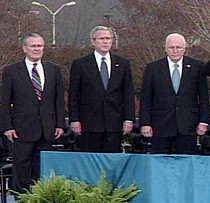2006年VOA标准英语-US Defense Secretary Says Farewell at Pentagon(在线收听)
|
By Al Pessin President Bush and other dignitaries gathered at the Pentagon Friday to say farewell to Defense Secretary Donald Rumsfeld, who will leave office on Monday. The president and others praised the often-controversial secretary for his dedication and leadership over the last six years. VOA's Al Pessin reports from the Pentagon.
President Bush called him "one of America's most skilled, energetic and dedicated public servants" and a man of "strategic vision" and deep devotion to the country and its men and women in uniform. He said, "This man knows how to lead. And he did it. And the country is better off for it." The president credited Rumsfeld with leading the U.S. military through two wars, helping the people of Iraq and Afghanistan gain their freedom, leading transformation efforts in the defense department and in the NATO alliance and reorganizing the U.S. command structure after the September 11t terrorist attacks in 2001. Friday's ceremony was held not far from where a passenger jet controlled by terrorists slammed into the Pentagon that day. President Bush also praised Rumsfeld for his efforts to stem the proliferation of weapons of mass destruction, for supervising the development of the new U.S. missile defense system and for implementing what the president called "the most sweeping transformation of America's global defense posture since the start of the Cold War" in the 1940s. After having said he intended to keep Secretary Rumsfeld in office until his term ends in 2009, President Bush announced Rumsfeld's departure from office last month, the day after his Republican party lost badly in congressional elections, largely due to public dissatisfaction with the continuing violence in Iraq. At Friday's ceremony, the top U.S. military officer, General Peter Pace, praised Secretary Rumsfeld for what he called the "courage" to speak his mind in public and in high level meetings, even when his ideas were not popular, and for the compassion he has for U.S. troops and their families. Rumsfeld's long-time friend and colleague, Vice-president Dick Cheney, teased Rumsfeld for being a tough boss, but also said he would not be vice-president today if not for the experience he had working for Rumsfeld early in his career. And Cheney added this definitive praise. "I believe the record speaks for itself. Don Rumsfeld is the finest secretary of defense this nation has ever had," he said. But Rumsfeld's tenure was also fraught with controversy. Among many difficulties, he was accused of not providing enough troops or the right strategy to ensure post-combat stability in Iraq and Afghanistan, and of allowing the abuse of prisoners at Abu Ghraib in Baghdad and elsewhere. He recently called the day he learned of the Abu Ghraib abuses the worst of his tenure, worse, apparently, than September 11. Taking the podium to say farewell, the 74-year-old defense secretary seemed to be moved by the applause of the crowd. He made his thank-yous, and then warned Americans not to give up in Iraq, in spite of what he called the "agonies" and "ugliness" of combat. He said that would only "embolden" America's adversaries. He said, "Today, it should be clear that not only is weakness provocative, but the perception of weakness on our part can be provocative, as well." "A conclusion by our enemies that the United States lacks the will, or the resolve, to carry out missions that demand sacrifice, and demand patience, is every bit as dangerous as an imbalance of conventional military power," he continued. The secretary also warned those who would threaten the United States not to conclude that Americans are reluctant to defend their way of life, just because they have a distaste for war. He also said the United States must do more militarily, because many U.S. allies are spending less on defense capabilities, and he warned that the struggle against those who want to destroy the democratic way of life will be a long one. Monday will mark the end of Rumsfeld's second term as defense secretary. He also served in the post during the Ford administration in the 1970s. He was both the youngest and the oldest man ever to hold the job, and, adding the two terms together, he will fall 11 days short of becoming the longest serving defense secretary in U.S. history. That distinction is held by Robert McNamara, who served in the 1960s during the Vietnam War. Rumsfeld's long career included service as a navy pilot, member of Congress, ambassador to NATO and a variety of other government posts, as well as a successful career as a corporate executive. He says he may write a book after he leaves office. |
||
